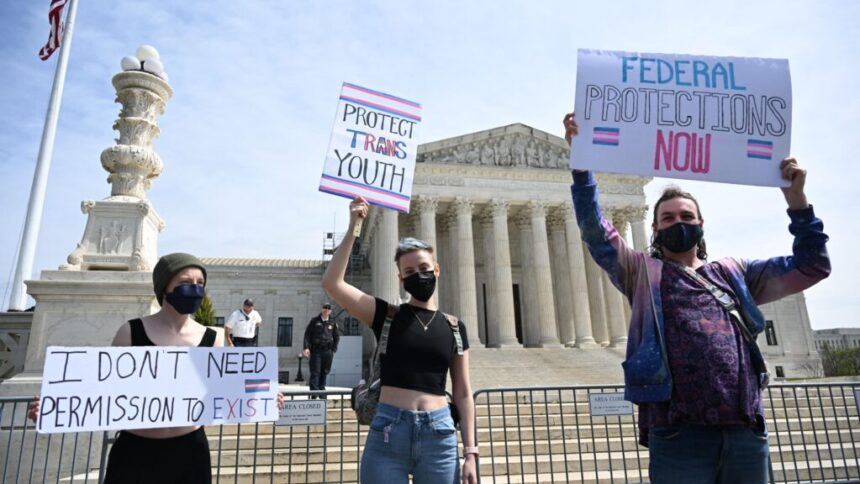The Supreme Court is set to hear arguments on Wednesday regarding Tennessee’s ban on gender-affirming care for youth, a case with significant implications for transgender individuals and healthcare regulation. This ban is just one of many enacted by states across the country, but it is the first to reach the highest court in the land.
The case, United States v. Skrmetti, questions whether Tennessee’s ban on gender-affirming care for youth violates the Equal Protection Clause of the 14th Amendment by discriminating against individuals on the basis of sex. The outcome of this case could impact not only access to gender-affirming care for minors and adults but also how other areas of healthcare are regulated, such as reproductive health and the interpretation of the Affordable Care Act’s nondiscrimination rule.
Experts believe that the case could bring together the legal and medical worlds and prompt a closer examination of how health regulation is evolving. The medical community has a vested interest in understanding these changes and their implications for patient care.
The ban in Tennessee, which was enacted in March 2023, prohibits minors from receiving gender-affirming care. Several families and a healthcare provider have challenged the law, arguing that it infringes on the rights of transgender individuals and violates constitutional protections. The case has already gone through several levels of the judicial system, with the Sixth Circuit ruling that the ban does not discriminate based on sex, contrary to earlier Supreme Court decisions.
Medical organizations, including the American Academy of Pediatrics and the American Medical Association, have filed briefs in support of overturning the Sixth Circuit’s decision. They highlight the mental health benefits of gender-affirming care for young people and stress the importance of providing safe and effective care.
While the focus of the Supreme Court arguments may not be solely on the scientific evidence supporting gender-affirming care, the outcome of the case could have far-reaching implications for transgender individuals and the healthcare system as a whole. The court could either uphold the ban, send the case back for further review, or strike down the ban altogether.
Regardless of the outcome, the case is likely to spark discussions about the intersection of healthcare and constitutional law, with implications for future healthcare policy and regulation. It remains to be seen how the Supreme Court will rule on this landmark case and what it will mean for transgender individuals seeking essential healthcare services. Justice Neil Gorsuch’s recent majority opinion on the issue of workplace discrimination based on gender identity or sexuality as a type of sex discrimination has sparked a significant debate in the legal and healthcare communities. In his opinion, Gorsuch emphasized that if the nature of the problem cannot be considered without taking into account the sex of the person involved, then it constitutes discrimination on the basis of sex.
The implications of this ruling could have far-reaching effects, especially in the context of healthcare policies and laws such as Section 1557 of the Affordable Care Act. This section prohibits discrimination by healthcare providers who receive federal funding based on various characteristics, including sex. The interpretation of whether bans on gender-affirming care constitute sex discrimination could potentially impact the ongoing debate over the scope of Section 1557.
The Supreme Court’s ruling on this matter could serve as a valuable tool for federal legislators and in legal challenges to Section 1557 from states. The application of different tiers of scrutiny to assess the constitutionality of laws targeting specific groups, particularly based on sex, plays a crucial role in determining the validity of such laws. The argument put forth by the Department of Justice that Tennessee’s ban on gender-affirming care should be subject to intermediate scrutiny highlights the significance of this case in upholding the rights of individuals.
If the Supreme Court rules in favor of Tennessee’s ban not constituting sex discrimination, it could potentially pave the way for the enactment of similar laws targeting gender-affirming care for other demographics. This could have broader implications for healthcare policies and regulations, potentially empowering states to regulate medical care more extensively.
Health policy experts have raised concerns that upholding bans on gender-affirming care for youth could lead to future restrictions on adult access to such care, both at the state and federal levels. The trend of states imposing restrictions on Medicaid funding for gender-affirming care for adults, as seen in Idaho, South Carolina, and Florida, underscores the need to address potential discriminatory practices in healthcare policies.
The Supreme Court’s decision in U.S. v. Skrmetti could potentially shift the balance of power between states and the federal government in regulating medical care. With contentious issues such as gender-affirming care and abortion at the forefront, there is a growing need to closely monitor how healthcare is regulated and ensure that individuals have access to essential medical services without facing discrimination.
As debates surrounding healthcare policies continue to evolve, it is crucial for clinicians and healthcare professionals to engage in advocacy efforts and participate in policy-making processes to uphold the rights of all individuals. The ripple effects of bans on healthcare services extend beyond the individuals directly affected, emphasizing the importance of promoting inclusive and equitable healthcare practices. The treatment of toe fungus may seem like a minor issue to some, but according to a recent statement, banning this treatment could have far-reaching consequences. The idea that “everybody would feel some sort of aftershock” from such a ban is certainly thought-provoking. Let’s delve deeper into the potential implications of prohibiting the treatment of toe fungus.
Firstly, toe fungus is a common condition that affects millions of people worldwide. It can cause discomfort, embarrassment, and even pain for those who suffer from it. Banning the treatment of toe fungus would leave these individuals without a viable solution to their problem. This could have a negative impact on their quality of life and overall well-being.
Furthermore, toe fungus is not just a cosmetic issue. If left untreated, it can lead to more serious health complications. In some cases, untreated toe fungus can spread to other nails or even to the skin, causing infections that may require medical intervention. By banning the treatment of toe fungus, we would be putting individuals at risk of developing these complications.
Additionally, the availability of treatment options for toe fungus contributes to the overall health and hygiene of society. By allowing individuals to address this common issue, we are promoting good foot health and reducing the spread of infection. Banning the treatment of toe fungus could have ripple effects on public health and hygiene.
In conclusion, while the idea of banning the treatment of toe fungus may seem insignificant at first glance, the reality is that such a decision could have far-reaching consequences. From impacting individual well-being to public health and hygiene, the repercussions of prohibiting this treatment are significant. It is essential to consider the implications of such a ban carefully and ensure that the health and well-being of individuals are prioritized.







